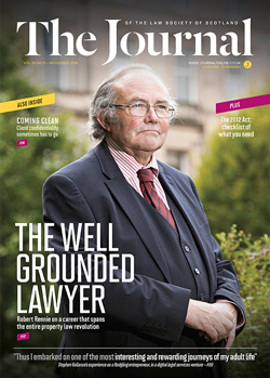Flesh on the bones
June Crombie outlined the changes announced in the 2014 Budget, giving individuals greater flexibility to access their pension savings, at Journal, May 2014, 30. More detail of the Government’s plans has emerged, in two bills now before Parliament.
Taxation of Pensions Bill
This bill will enact the necessary changes to the existing pension tax rules, along with anti-avoidance provisions to prevent abuse of the new flexibility. The bill had its Commons second reading on 29 October.
From 6 April 2015, someone with money purchase pension savings will be able to access their fund in full once they reach age 55. Individuals will be able to do this by:
- buying a lifetime annuity;
- taking a scheme pension;
- choosing to enter drawdown (by buying a drawdown product or taking a short-term annuity); or
- making cash withdrawals from the fund in one or more lump sums, 75% of each withdrawal being subject to income tax at their marginal tax rate, and 25% being free of tax.
The current flexible drawdown regime will be repealed, and individual accounts automatically converted to a flexi-access drawdown fund on 6 April 2015. Those in capped drawdown will be able to choose whether to remain there or convert to flexi-access drawdown.
The Government intends to prevent the new system being exploited for unintended tax advantages, by introducing a reduced annual allowance for money purchase savings where the individual has flexibly accessed their savings. To prevent widespread recycling, once income starts to be drawn from a pension, the money purchase allowance will reduce to £10,000 per year.
Certain restrictions on annuities are to be removed:
- annuities will be able to decrease in payment;
- lump sum payments will be permitted if chosen from the outset;
- guarantee periods of greater than 10 years will be permitted for lifetime annuities;
- benefits from a guaranteed annuity may be paid to surviving beneficiaries by lump sum, up to a £30,000 limit.
The Government acknowledged that the 55% special charge that is due on certain lump-sum death benefits is too high. It is now proposed that on the death of:
- an individual under age 75, currently in drawdown or who has not yet started to take a pension, the fund can pass to beneficiaries tax-free;
- an individual over age 75, the beneficiaries can either draw down themselves from the fund (taxed at their marginal rate), or take it as a lump sum (taxed at a flat 45% rate and from 2016-17 at their marginal rate).
- The reforms will apply to payments made on or after 6 April 2015, rather than deaths after that date.
The Government consulted and decided against a full statutory override, on the basis that this could force schemes to incur additional costs. Instead, a so-called “permissive override” will allow a registered pension scheme to make certain payments under the flexibility regime even if its governing rules would prohibit them.
Amendments to the original version of the bill impose onerous information requirements on individuals and administrators when an individual first flexibly accesses their defined contribution pension benefits. A new part in the schedule applies flexible access to non-UK pension schemes that have received full UK tax relief.
Pension Schemes Bill
Amongst other things, this bill provides safeguards in relation to the new flexibilities. The Government is concerned that individuals making decisions about what to do with their pension savings at retirement should have advice during the process. A formal “guidance guarantee” is to be introduced, imposing a duty on pension providers and trustees to offer guidance to all individuals with a money purchase pension at the point of retirement. The Government has announced that Citizens Advice and the Pensions Advisory Service will be its guidance guarantee providers, the guidance being funded by a levy on financial services firms.
The bill also prohibits transfers to money purchase schemes from unfunded public-sector defined benefit schemes. Members of the latter schemes will be able to transfer subject to certain safeguards.
Other amendments
In contemplation of the 2015 changes, interim measures in the Finance Act 2014 came into force on 27 March, relaxing the basis on which income drawdown currently operates and allowing a greater number of small pensions to be commuted on grounds of triviality.
The Government has also indicated it will increase the normal minimum pension age from 55 to 57 by 2028, to reflect rising longevity and the increase in state pension age to 67. It is understood that this change will be enacted in primary legislation during the next Parliament.
There are still several unknown factors. The bills will be subject to further amendment. Also, a key unknown factor is the impact on the demand for annuities. Additionally, the wider economic impact of the changes is as yet unknown.
In this issue
- Age before duty
- Title to tissue
- Standing the test of time?
- Adjudication: a risk of abuse?
- Courts in all but name
- When is a person a “relevant person”?
- Reading for pleasure
- Opinion: John Scott QC
- Book reviews
- Profile
- President's column
- People on the move
- The designated day is here
- A tale of two systems
- LBTT: the rules and rates emerge
- The price of probity
- Play to your strengths
- Into the unknown
- A changing landscape
- Get the basics right
- Holiday pay: give us a break
- Money into thin air?
- Pathways to justice
- Flesh on the bones
- Scottish Solicitors Discipline Tribunal
- Streams of thought
- Over the finishing line
- Over the finishing line (full version)
- Law reform roundup
- The path less travelled
- The right kind of risk
- Frauds and scams – increasing awareness
- Ask Ash
- The process engineer's tale
- To disclose or not to disclose?






